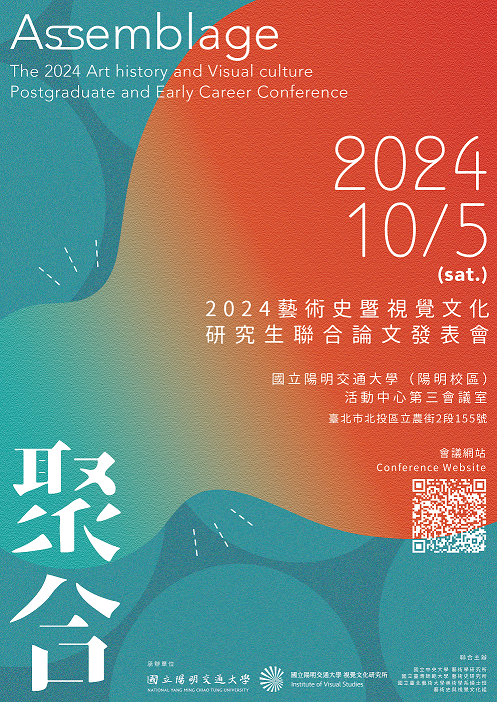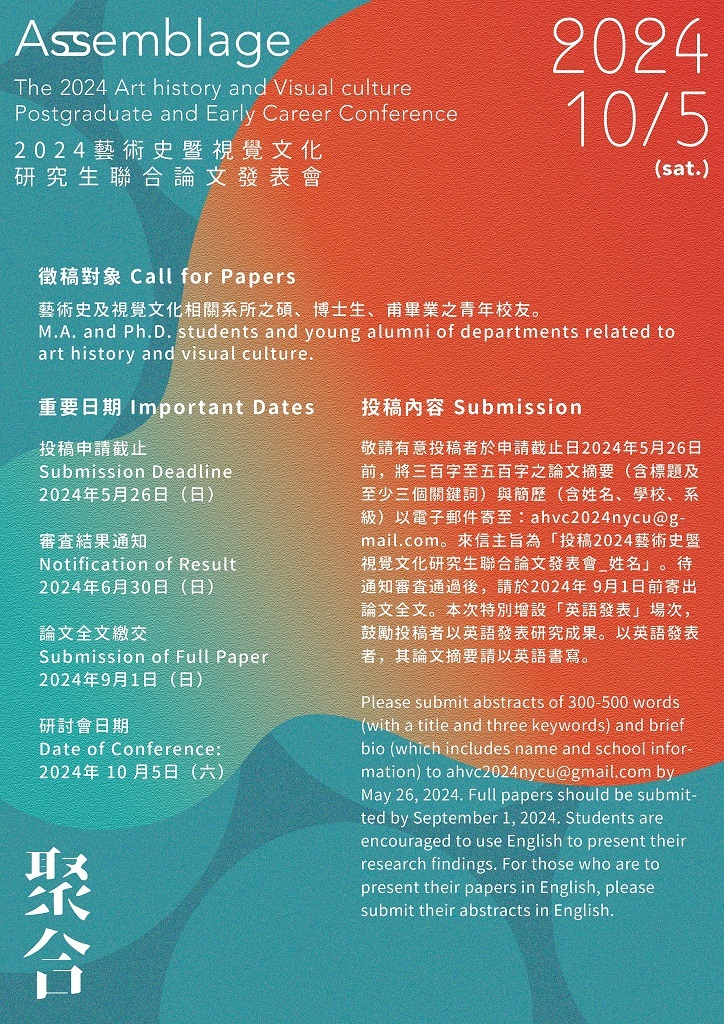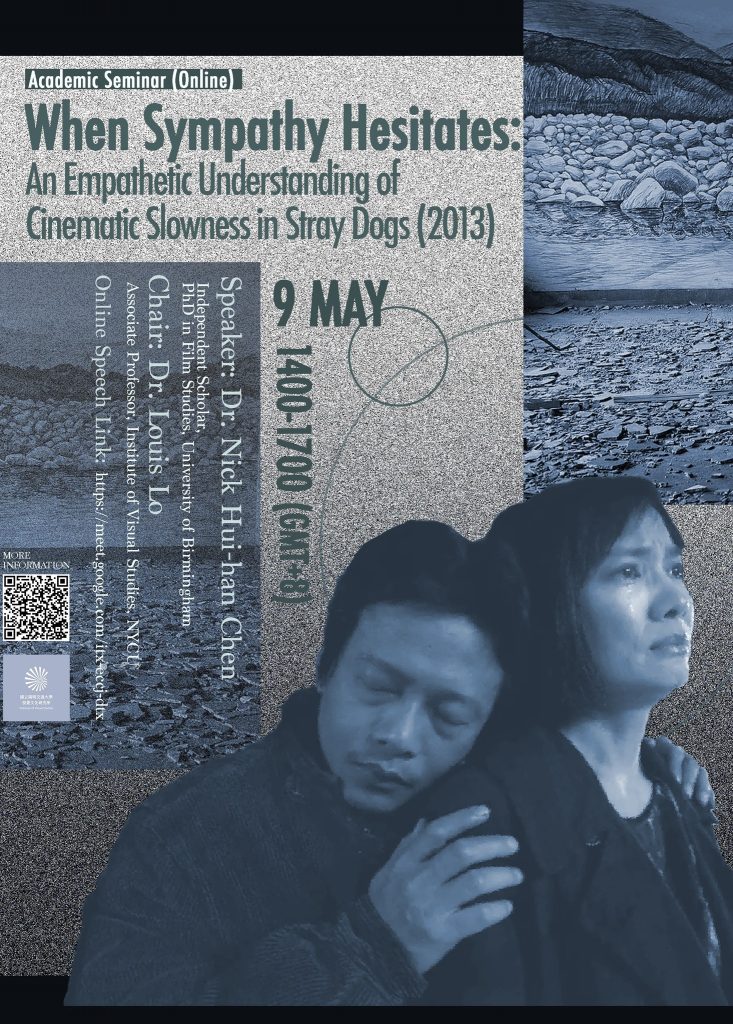【科社所演講】戰後臺灣經濟史中的工程師活動:研究議題與資料調查

戰後臺灣經濟史中的工程師活動:研究議題與資料調查
時間:2024年5月21日(二)10:00-12:00
地點:國立陽明交通大學 新竹光復校區 人社二館106A研討室
主辦者:洪紹洋(科技與社會研究所、社會與文化研究所合聘教授)
主辦單位:國立陽明交通大學社會與文化研究所
如欲出席實體工作坊,請5/16前填寫報名表單,歡迎大家踴躍參加!https://forms.gle/8p2Tt6UjMU5Z3pje6
演講簡介
本活動的舉辦,以對使用史料檔案有興趣的研究生為對象,說明如何透過政府檔案、回憶錄、校友資料等各種早期文獻,還有口述訪談等途徑,瞭解個人與不同群體間的工程師之活動與互動。具體的案例討論,將闡述1945年起至1950年代間臺灣的工程師在日治和戰後中國的雙重脈絡下,以公民營企業為例,以及來自中國的交通大學校友進行考察。
【心哲所課程】USR智齡講堂課程:心靈與意識探索

【USR智齡講堂課程】
課程名稱:心靈與意識探索
時間:九月初至十二月中,星期四,13:20-15:10,共八週
地點:國立陽明交通大學陽明校區
主辦單位:國立陽明交通大學社會責任計劃與心智哲學研究所
講師:洪裕宏 教授
1. 心靈從哪裡來?
2. 破碎的心靈:大腦也會生病
3. 動物有沒有意識?從單細胞到人。
4. 人工意識可能嗎?生物人與機器人。
5. 意識怎麼產生的?有大腦是必要條件嗎?
6. 自我、時間、記憶與意識經驗
7. 訊息、夢、虛擬實境與靈魂不朽
8. 萬物相互關聯,沒有獨立存在的個別事物
免費課程,名額有限,可全程出席,不請假者,優先錄取。
報名網址:https://forms.gle/K61JaioZicb4XwAZ6
報名截止日期:2024年8月15日
*歡迎校外人士報名
視文所:2024年藝術史暨視覺文化研究生聯合論文發表會—徵稿啟事


今年藝術史暨視覺文化研究生聯合論文發表會由陽明交通視覺文化研究所榮譽主辦,誠摯邀請各相關系所之碩士、博士生,以及最新畢業的青年校友們踴躍投稿!邀請你在這個展示與交流的舞台上分享你獨特的發現與見解,無論你的研究領域是古今中西藝術史、視覺文化分析、藝術理論,或是其他相關主題,我們都熱切期待你的參與!
徵稿對象
・藝術史及視覺文化相關系所之碩、博士生、甫畢業之青年校友。
投稿內容 Submission
敬請有意投稿者於申請截止日2024年5月26日前,將三百字至五百字之論文摘要(含標題及至少三個關鍵詞)與簡歷(含姓名、學校、系級)以電子郵件寄至:ahvc2024nycu@gmail.com。
來信主旨為「投稿2024藝術史暨視覺文化研究生聯合論文發表會_姓名」。待通知審查通過後,請於2024年 9月1日前寄出論文全文。本次特別增設「英語發表」場次,鼓勵投稿者以英語發表研究成果。以英語發表者,其論文摘要請以英語書寫。
重要日期
・投稿申請截止:2024年5月26日(日)
・審查結果通知:2024年6月30日(日)
・論文全文繳交:2024年9月1日(日)
・發表會日期: 2024年10月5日(六)
※更多詳細資訊請參考活動網站:
https://ahvc2024nycu.wixsite.com/ahvc2024
Developmental Trajectory of Argument Structures Among Mandarin-Speaking Children

【112學年度心哲所春季心智系列講座】
Our next 2024 Spring Research Seminar talk is on May 10 (Fri). Information about this talk:
Speaker: Dr. Brian Yowyu Lin (National Taiwan University)
(https://www.forex.ntu.edu.tw/lin-yowyu/?lang=en)
Time & Place: May 10 (Fri) 15:30-17:20, ZhiXing Building Room 321, Yang Ming campus in Taipei City, National Yang Ming Chiao Tung University
Format: In English
Title:
Developmental Trajectory of Argument Structures Among Mandarin-Speaking Children
(The theme of this invited talk is related to psycholinguistics, linking topics of mind/brain, psychology, and linguistics. It may be interesting to compare analytical philosophy/philosophy of language with the topic in this talk, which adopts a perspective rooted in the realms of cognition, psychology, and language analysis.)
Abstract:
This study aimed to examine Borer and Wexler’s Maturation Hypothesis and Mandarin-speaking children’s developmental trajectory of argument structures. According to Borer and Wexler’s Maturation Hypothesis, even though children are born with all the syntactic components needed to learn a language, these components don’t become mature until roughly the age of four. To date, many studies have examined Maturation Hypothesis but the results are still far from conclusive. To further investigate the Maturation Hypothesis, the present study examines Mandarin unaccusatives with preverbal and postverbal arguments, unergatives and passives. If the Maturation Hypothesis is correct, children’s comprehension of unaccusatives with postverbal arguments and unergatives would precede their understanding of unaccusatives with preverbal arguments and passives. Preliminary results confirmed the Maturation Hypothesis. Mandarin children across one to four years old showed much better understanding of unaccusatives with postverbal arguments and unergatives than of the other two structures.
For more seminar information: https://forms.gle/bggagJWPLUT2K7W89
When Sympathy Hesitates: An Empathetic Understanding of Cinematic Slowness in Stray Dogs (2013)

講題:When Sympathy Hesitates: An Empathetic Understanding of Cinematic Slowness in
Stray Dogs (2013)
講者:Dr. Nick Hui-han Chen ( PhD in Film Studies, University of Birmingham)
主持人:勞維俊 (國立陽明交通大學視覺文化研究所副教授)
活動時間:113年5月9日(四) 下午2:00-5:00
線上演講連結:https://meet.google.com/itx-eccj-dtx
—
演講資訊:
Abstract:
With its minimalist narrative and long durational recordings of a family living on the margins of
modern society and drifting around deserted urban spaces in Taiwan, Stray Dogs (Jiaoyou, Tsai
Ming-liang, 2013) provides a productive reading of cinematic slowness and a critique of the
globalising domination of capitalism and neoliberalism in a locally and culturally specific context.
This paper will use Stray Dogs as a case study to explore how slow cinema encompasses both a
narrative that requires the audience’s sympathetic and intellectual understanding and a durational
perception of time that calls for empathy and intuition. We will look at the film’s temporal
illegibility and radical use of long takes through an analysis of Gilles Deleuze’s formulation of
‘peaks of present’ and ‘sheets of past’. Moreover, I will repurpose this Deleuzian reading, through a
study of David Martin-Jones’ idea of ‘a hesitant cinematic ethics’, as a moment of hesitation that
leads to an act of resistance – a resistance against the ongoing capitalist and neoliberal
standardisation, rationalisation and homogenisation of time’s, or more specifically duration’s,
heterogenous nature. By exploring the potential of ethical hesitation and political resistance,
underscored by slow aesthetics such as the use of long takes, this paper aims to make the case for a
specific and unique understanding of cinematic slowness as a philosophical signifier of empathy.
Speaker’s Bio:
An independent scholar, Nick Chen is awarded his PhD in Film Studies by the University of
Birmingham. He is currently working on his first monograph based on his doctoral thesis on slow
cinema. His recent journal articles can be found in Film-Philosophy and Deleuze and Guattari
Studies, both published by Edinburgh University Press.
Essential readings:
David Martin-Jones (2019). Cinema Against Doublethink: Ethical Encounters with the Lost Pasts
of World History. Routledge. Chapter 2 (pp. 63–88).
Gilles Deleuze (1985/1997). Cinema 2: The time-image. (H. Tomlinson & R. Galeta, Trans.).
University of Minnesota Press. Chapter 5 (pp. 98–125).
Stray Dogs 郊遊 (2013) Dir. Tsai Ming-liang 蔡明亮.
Recommended readings:
Bergson, Henri (1946/2007) The Creative Mind: An Introduction to Metaphysics. Translated by
Mabelle L. Andison. New York: Dover Publication. Chapter 4 (pp. 125–151).
Hui-Han Chen (2023) ‘When Sympathy Hesitates: An Empathetic Understanding of Cinematic
Slowness in Stray Dogs’, Film-Philosophy, 27 (3).
Louis Lo (2019) ‘Enduring the Long Take: Tsai Ming-liang’s Stray Dogs and the Dialectical
Image’, CLCWeb: Comparative Literature and Culture, 21 (5).
Song Hwee Lim (2014). Tsai Ming-liang and a Cinema of Slowness. University of Hawai’i Press.
Introduction (pp. 1–10).
Tiago de Luca & Nuno Barradas Jorge (Eds.) (2016). Slow Cinema. Edinburgh University Press.
Introduction (pp. 1–21).

